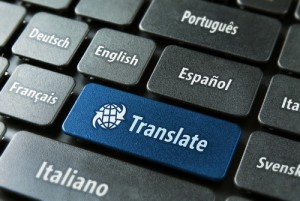A few years back, a New York Times article featured the difficulty translators encounter translating a joke from one language to the next. Although not impossible, it’s a very specialized skill as so many different elements are involved within a joke. A good majority of jokes are dependent on context or wordplay, and it can be extremely difficult to recreate the tone necessary to make them work when translating from one language to another. Puns are notoriously difficult.
Jokes are one thing; legal and medical documents are a whole other matter. A wrong word or improper sentence structure could produce dire consequences. This is why the debate over machine vs. human translation services is so critical. For years, we have been hearing that machine translation has superseded the capabilities of human translation. Arguments for automated translation have included speed and consistency. While the temptation might be there to use a machine translation for a rush job, one question that must be considered is whether there are inherent problems using machine translations of human writings in a different language?
The answer to this question is a resounding yes. This is not to say that technology hasn’t made great strides in regard to translation. Google is currently using a translation method with its machine services that incorporates vector space mathematics to find relationships among words in different languages. Google can do this through its own data mining technology. However, the art of translation is just that: an art. Issues concerning translation that may be beyond the scope of machine translation right now include:
- Context,
- The Number of Languages in Existence, and
- Finding the Right Word among Many Possibilities.
We began our post noting how difficult it is to translate a joke. Could you imagine a machine translating a joke from a George Carlin album or even the Three Stooges? While a poorly translated joke might result in missed laughs, a poorly translated medical or legal document can have far-reaching consequences.
For example, a medical document that isn’t translated correctly for a life sciences company could delay a product’s introduction to market or affect compliance reporting. A legal document that isn’t translated correctly could lead to disputes over technical terms or even damage a legal case. Human translation services are also critical for foreign patents, protecting intellectual property and allowing entrepreneurs and companies to focus on core business issues instead.
While machine translation services certainly have their place and can provide great translation services for the right situation, when language matters the most, human translation services are still the standard, particularly when technical expertise is a requirement.
At Morningside, our translators are experts in their field and natives of the target language, so they have the skills and knowledge to provide accurate translations every time. They have specific training in any technical field related to the subject and heavy experience working with different types of documents. Although machines have come a long way, when translating documents, whether we’re talking about jokes or legal depositions, translation still requires a human touch.


